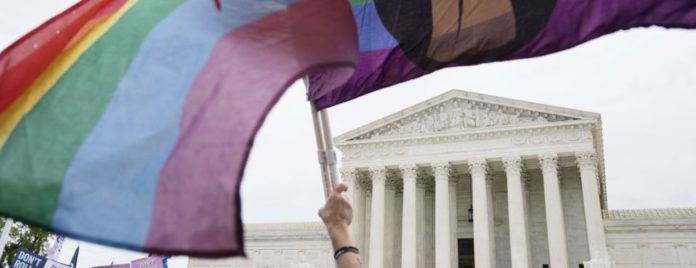
The Supreme Court’s ruling in a fight over the city of Philadelphia’s refusal to continue contracting with a Catholic foster care agency that discriminates against same-sex couples could have a major impact on health care.
If the court rules broadly and grants the religious exemption Catholic Social Services is after, it could open the door for other challenges against anti-discrimination protections in government contracting, legal scholars say. That could put LGBTQ people particularly at risk of being refused treatment by religiously affiliated hospitals and health systems, many of which rely on federal funding to survive.
Catholic hospitals treat more than one in seven patients daily, according to the Catholic Health Association.
“The federal government has chosen to give religiously affiliated institutions so much in taxpayer dollars, especially in health care,” said Elizabeth Sepper, a professor of law at the University of Texas at Austin School of Law.
“This case, to the extent it tells the government you can’t impose conditions on religious activists that they resist, could destabilize the system entirely. We don’t have a system of federally run hospitals.”
Big Implications
A ruling is expected to be released shortly in the case Catholic Social Services brought to keep its contract as a licensed foster care agency after the city of Philadelphia learned the organization would not place foster care children with same-sex couples.
Philadelphia argued Catholic Social Services violated its contract with the city and Philadelphia’s Fair Practices Ordinance, which ban discrimination based on race and sexual orientation.
“The City has good reason for applying its general ban on discrimination in this context. Excluding qualified parents based solely on their sexual orientation, DHS Commissioner Cynthia Figueroa has explained, would do a disservice to children in the foster system, unnecessarily limit the pool of available parents, and send ‘a very strong signal to [the LGBTQ] community that [its] rights are not protected,’” attorneys for the city argued in a brief.
But Catholic Social Services (CSS) says the city violated its First Amendment rights to free speech and exercise of religion by excluding it from the city’s foster care program.
“Here, CSS is asking that it not be compelled to affirm same-sex marriages as the price of continuing a religious ministry,” attorneys with The Becket Fund for Religious Liberty argued on behalf of the group.
CSS has asked the court to revisit its 1990 decision in Employment Division v. Smith, in which the court held generally applicable, neutral laws don’t violate the free exercise clause of the First Amendment.
“One of the problems with the Smith decision is that governments can try to use laws that on their face are neutral but in practice still target religious beliefs,” said Nick Reaves, counsel for The Becket Fund for Religious Liberty.
If the court sides with CSS, it could change the law governing religious liberty. That could have implications in health care, health law scholars say.
There are a huge number of Catholic hospitals operating in health care, and at this time they do have to abide by rules like Section 1557 of the Affordable Care Act that make it so you can’t discriminate on the basis of sex, said Nicole Huberfeld, an Edward R. Utley professor of health law at Boston University’s School of Public Health and professor of law at its School of Law.
The Biden administration has signaled plans to rewrite rules to extend the ACA’s anti-discrimination protections to sexual orientation and gender identity. The Trump administration stripped LGBT people from the protections in a rule that’s still being litigated, but some courts have reinstated the Obama administration rule that extended the protections to transgender people after the Supreme Court’s holding in Bostock v. Clayton County, Ga.
In that case, the Supreme Court said discrimination on the basis of sexual orientation or transgender status counts as unlawful sex discrimination in employment under Title VII of the Civil Rights Act. Section 1557 of the ACA was based on Title IX, which bans discrimination in education and federally funded programs. Some argue sex should be interpreted differently in the health-care context.
“I do think this could open the door to exclusion that has been closed,” Huberfeld said of the court’s ruling in the foster care case.
‘Made Up Concern’
But advocates for religious liberty say the fears of LGBTQ discrimination are fabricated.
“That’s really a red herring,” Reaves said. “We’ve done a lot of work in the religious liberty space and we represent the Christian Medical and Dental Association in other matters, and no doctor would turn away a sick or injured person because of their LGBTQ status.”
“It’s really a made up concern,” he said, especially right now during the Covid-19 pandemic.
LGBTQ rights advocates, however, say discrimination is already a pervasive problem in health care.
“Non-discrimination laws have improved access to health care for LGBTQ people, but the broad exemption sought here would reverse that progress,” GLBTQ Legal Advocates & Defenders, formerly known as GLAD, argued in a friend-of-the-court brief in support of Philadelphia.
Given the court’s questioning during oral arguments in October, Sepper believes the court will ultimately rule in favor of CSS.
“The question is how big of a hole that the Supreme Court tears into the fabric of equality that we’ve been trying to build in health care and elsewhere,” she said.
The case is Fulton v. Philadelphia, U.S., No. 19-123.








